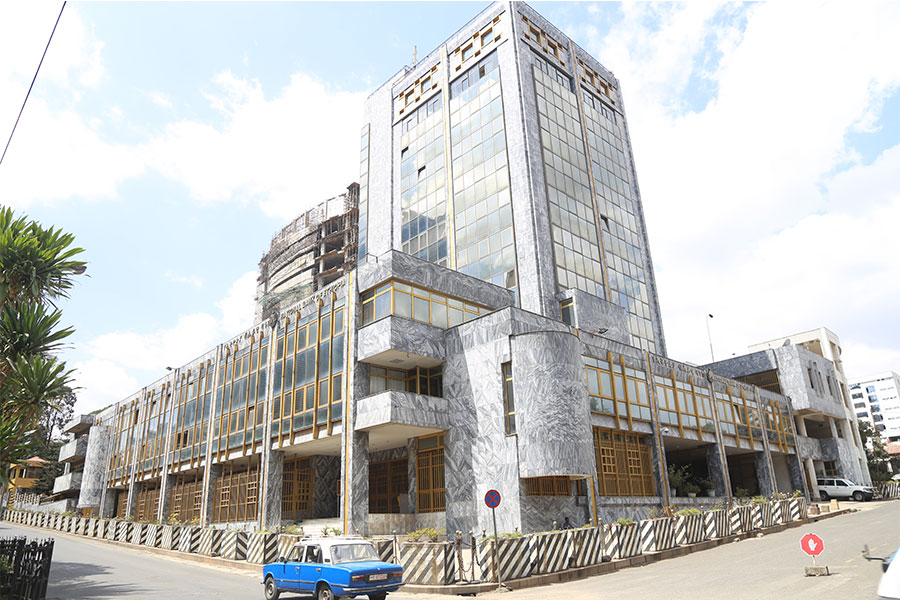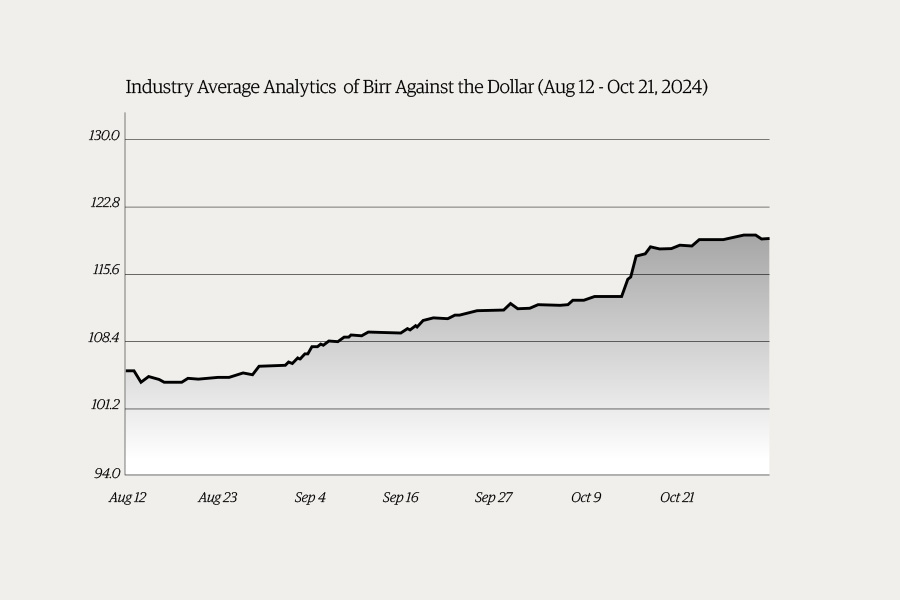
Featured | Sep 07,2025
Nov 9 , 2024.
Ethiopia's foreign exchange debacle resembles a tangled web of contradictions and constraints. The country's trade financing state remains besieged by systemic bottlenecks, escalating costs, and a widening chasm between emerging economic elites and struggling small enterprises. Yet, both micro-enterprises and large firms face identical rejection rates of 83pc for trade finance applications. Here is an anomaly which defies conventional wisdom, as larger firms were thought to enjoy better access to credit due to stronger financial standings and established relationships with banks.
Importers, too, confront delays stretching up to three years for non-essential goods and four to 12 months even for essentials. The backlog is suffocating. Small businesses crumble under soaring operational costs, while larger firms resort to alternative financing at exorbitant rates. Letters of credit (LCs), a traditional trade finance instrument, are used by 42pc of importing firms, eclipsing the African average of 15pc. The heavy reliance contrasts sharply with global trends favouring more flexible financing options.
Banks charge an average of 7.76pc in commission and fees for letters of credit, with some private banks pushing rates as high as 10.25pc. These charges dwarf those in Ghana (2.3pc) and Nigeria (3.5pc), signalling a market response to severe foreign exchange shortages. Banks leverage their role in issuing letters of credit to maximise earnings at importers' expense, a burden ultimately shouldered by consumers where inflation remains double-digit.
Ethiopia's foreign exchange crisis is neither new nor surprising. Former Finance Minister Sufian Ahmed once remarked that it was unlikely to be resolved in his lifetime. The import bill totalled 14.7 billion dollars last fiscal year, with imports crucial not only for consumption but also as inputs for export-oriented industries.
Enter franco valuta (FV), a mechanism allowing importers to use external private sources of hard currency, ostensibly designed to bypass forex allocation bottlenecks. Policymakers laud the scheme for generating four billion Birr in tax revenue last year, viewing it as a pragmatic response to a structural forex crunch.
Data from the second quarter of the fiscal year 2023/24 indicate that total imports through franco valuta reached 1.95 billion Br, a 5.6pc increase compared to the same period last year and a substantial 58.4pc rise from the previous quarter. The surge implies a robust rebound in import activities after a period of contraction.
Notably, machinery imports skyrocketed to 674.1 million dollars in the second quarter of 2023/24 from 214.5 million dollars during the same period the previous year, a staggering 214.3pc year-on-year increase. The escalation could indicate accelerated investment in infrastructure and industrial projects, possibly driven by the public sector. The medical and pharmaceutical industries experienced an even more dramatic upswing. Imports soared by 1,778.1pc year-on-year, reaching 4.6 million dollars. This surge may uncover heightened demand for healthcare products, influenced by public health initiatives or responses to ongoing health crises.
Metal and metal manufacturing imports nearly doubled year-on-year, rising by 98.7pc to 130.7 million dollars, echoing the surge in machinery imports and indicating broader expansion in manufacturing and construction activities. Conversely, imports of food and animals products plummeted by 68.8pc year-on-year, dropping to 135.9 million dollars.
Perhaps the economy's volatility is behind these fluctuations. While the uptick in imports through franco valuta, particularly in machinery and industrial inputs, reveals a trend toward a potential revitalisation of the industrial sector, the decline in food imports should raise questions about food security and domestic agricultural performance.
Since its reintroduction, the franco valuta scheme has served as a safety valve for a country gasping for liquidity. According to findings by the Policy Studies Institute (PSI), nearly 40pc of importers rely on self-financing or informal channels to sustain operations. A textile manufacturer in Addis Abeba encapsulated the sentiment: "Waiting for official forex is like waiting for rain in the desert. With franco valuta, at least I can keep my looms running."
Yet, as the scheme gains traction, it raises concerns about equity and oversight. While it benefits well-heeled importers with access to diaspora networks or offshore accounts, smaller players are left scrambling.
Are policymakers widening the gap - somewhat inadvertently - between the economic elites and struggling small and medium enterprises?
The PSI report uncovers a striking disparity. Though representing 10.5pc of surveyed businesses, large firms commanded a disproportionate share of forex allocations, while micro-enterprises, comprising nearly 30pc, were routinely sidelined. The rejection rate for trade finance applications was at 56pc, with collateral and creditworthiness cited as common barriers. Yet, paradoxically, default rates remain low at 2.5pc to 3.6pc over the two years before 2022, well below the African average of eight percent.
The informal nature of the franco valuta scheme risks entrenching a parallel economy, undermining efforts to streamline forex management. Reports of inflated prices and opaque dealings abound. Importers desperate for hard currency often pay high premiums. This could be an incendiary mix for an economy besieged by rampant inflation.
Policymakers face a conundrum. They see in the scheme a pragmatic response to dire forex shortages. However, it could also risk becoming a crutch, delaying systemic reforms. The National Bank of Ethiopia (NBE) had attempted to prioritise forex for strategic imports. Yet enforcement was inconsistent, with anecdotal evidence suggesting a lack of transparency in allocation processes.
The federal government's plan to ban the franco valuta scheme requires a careful and measured approach. While it initially aided the manufacturing sector during times of forex shortage, it also facilitated unintended consequences. Prime Minister Abiy Ahmed (PhD) and central bank Governor Mamo Mihretu have acknowledged that the scheme has inadvertently contributed to parallel market fluctuations and capital flight concerns, prompting assessments and hinting at impending policy reversal.
A complete shutdown of the scheme could suppress economic activities reliant on imports, thrusting businesses back into the quagmire from which they sought an escape. Banks already strained by high foreign currency demands may struggle to fill the void, potentially resulting in further delays, increased costs, and administrative bottlenecks.
A recalibrated approach that introduces strong monitoring mechanisms may curb adverse effects without halting the benefits the scheme brings to the market. Implementing stricter oversight, enhanced reporting requirements, and penalties for misuse could help retain advantages while reducing market distortions. Policymakers could uphold their initial intent of supporting traders and businesses without allowing franco valuta to become a gateway for illicit practices.
Digitalisation could be part of the solution. Platforms like eTrade Connect and blockchain-based trade finance systems have streamlined processes in other emerging markets, reducing reliance on informal mechanisms. Ethiopia could benefit from embracing technology to enhance transparency in forex allocation and improve accessibility to trade finance.
Ultimately, the Franco Valuta scheme should be seen as a stopgap, not a panacea.
Policymakers should tread carefully, leveraging the scheme to stabilise imports while fast-tracking broader reforms. Otherwise, they are bound to risk perpetuating a cycle where only those with deep pockets thrive, leaving the rest floundering in bureaucratic inertia and market distortions. Survival in the short term should not come at the cost of sustainable growth. The Franco Valuta policy may buy time, but the clock is ticking for the administration to display its firepower in the forex game.
PUBLISHED ON
Nov 09,2024 [ VOL
25 , NO
1280]

Agenda | Jan 07,2024

Fortune News | Feb 23,2019

Fortune News | Aug 18,2024

Money Market Watch | Nov 03,2024

Commentaries | Jul 02,2022

Photo Gallery | 180265 Views | May 06,2019

Photo Gallery | 170462 Views | Apr 26,2019

Photo Gallery | 161488 Views | Oct 06,2021

My Opinion | 137267 Views | Aug 14,2021

Dec 22 , 2024 . By TIZITA SHEWAFERAW
Charged with transforming colossal state-owned enterprises into modern and competitiv...

Aug 18 , 2024 . By AKSAH ITALO
Although predictable Yonas Zerihun's job in the ride-hailing service is not immune to...

Jul 28 , 2024 . By TIZITA SHEWAFERAW
Unhabitual, perhaps too many, Samuel Gebreyohannes, 38, used to occasionally enjoy a couple of beers at breakfast. However, he recently swit...

Jul 13 , 2024 . By AKSAH ITALO
Investors who rely on tractors, trucks, and field vehicles for commuting, transporting commodities, and f...

Nov 2 , 2025
The National Bank of Ethiopia (NBE) has scrapped the credit-growth ceiling that had s...

Nov 2 , 2025 . By SURAFEL MULUGETA
The burgeoning data mining industry is struggling with mounting concerns following th...

Nov 2 , 2025 . By YITBAREK GETACHEW
Berhan Bank has chosen a different route in its pursuit of a new headquarters, opting for a transitional building instea...

Nov 2 , 2025 . By BEZAWIT HULUAGER
Nib International Bank S.C. has found itself at the epicentre of a severe governance...